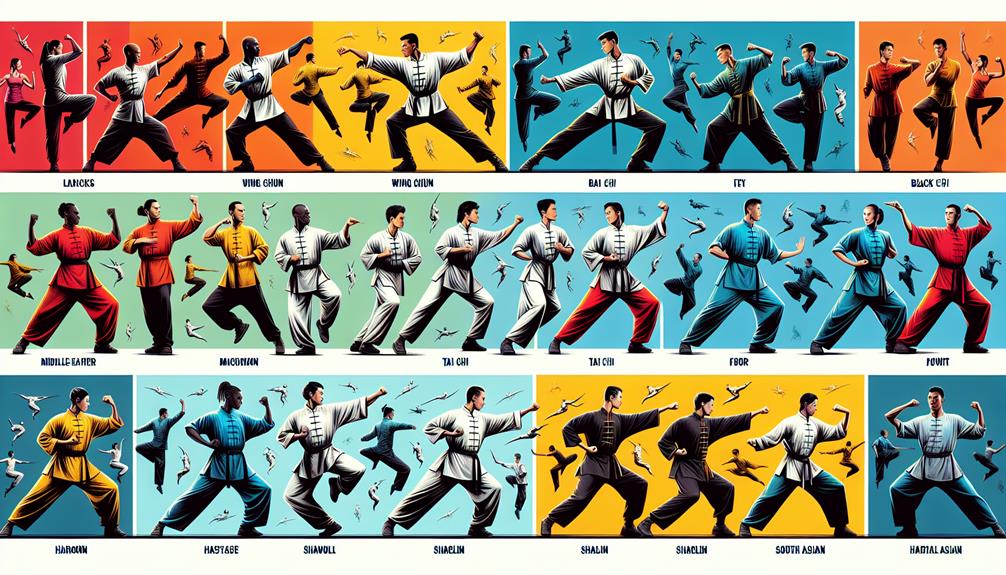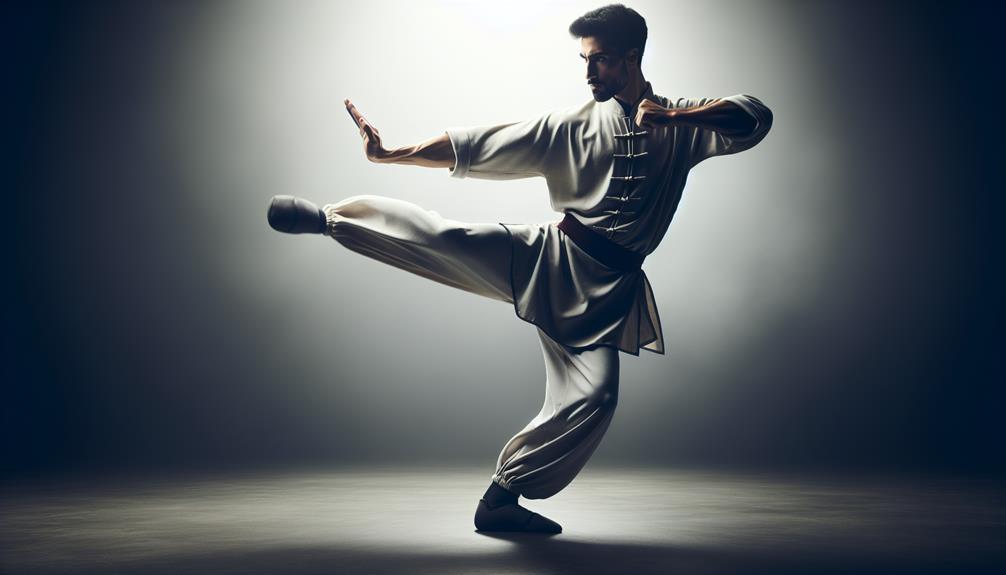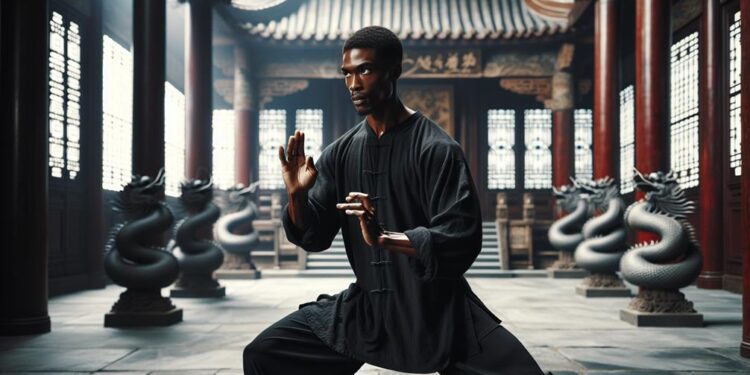Have you ever watched the legendary Bruce Lee effortlessly demonstrate his mastery of Kung Fu in movies like 'Enter the Dragon'?
The art of Kung Fu goes beyond flashy kicks and punches; it embodies centuries of tradition and discipline.
As you explore the world of Kung Fu, you'll uncover not only physical techniques but also a philosophy rooted in respect, perseverance, and self-improvement.
Ready to discover the secrets behind this revered martial art and delve into the mindset of its practitioners?
Key Takeaways
- Kung Fu embodies physical discipline, mental focus, and spiritual principles.
- Training improves fitness, mental clarity, and cultivates a strong work ethic.
- Techniques demand precision, continuous refinement, and unwavering focus.
- Mastery requires consistent training, attention to detail, and breath control.
Origins of Kung Fu
Kung Fu originated in ancient China as a form of self-defense and physical training, developing over centuries into a sophisticated martial art system known for its diverse styles and techniques.
The roots of Kung Fu are deeply intertwined with Chinese history, with legends suggesting that it was first practiced at the renowned Shaolin Monastery. This historical monastery became a sanctuary for Buddhist monks, who, in addition to their spiritual pursuits, sought ways to protect themselves from bandits and invaders.
As a result, they began to develop fighting techniques that later evolved into what we now know as Kung Fu. The monks' dedication to mastering these techniques not only contributed to their self-defense but also laid the foundation for the various styles and forms that characterize Kung Fu today.
The fusion of physical prowess, mental discipline, and spiritual principles at the Shaolin Monastery played a significant role in shaping Kung Fu into a holistic martial art system that continues to inspire and captivate practitioners worldwide.
Principles of Kung Fu
The core principles of Kung Fu embody a harmonious blend of physical techniques, mental focus, and philosophical underpinnings that guide practitioners towards mastery and self-improvement. When engaging with Kung Fu, you'll find that the following principles are fundamental to your practice:
- Balance and Focus: Kung Fu emphasizes the importance of finding equilibrium in both physical movements and mental clarity. Maintaining balance in stances and focusing your mind on the present moment are key aspects of this martial art.
- Strength: Kung Fu cultivates physical strength through rigorous training routines that target different muscle groups. This strength isn't just about power but also about endurance and resilience.
- Flexibility: Flexibility plays a crucial role in Kung Fu, allowing practitioners to execute techniques with precision and fluidity. Stretching exercises are incorporated to enhance flexibility and prevent injuries.
- Discipline: Discipline is at the core of Kung Fu practice, shaping not only the body but also the mind. It instills dedication, perseverance, and a strong work ethic in practitioners, essential for progress in this martial art.
Types of Kung Fu

One can categorize the diverse array of Kung Fu styles based on their unique techniques, origins, and philosophical foundations. Shaolin techniques, originating from the famous Shaolin Monastery in China, are known for their emphasis on powerful strikes, kicks, and acrobatic movements. This style focuses on both external and internal strength development, incorporating a wide range of combat techniques.
On the other hand, Wing Chun forms, developed in the southern part of China, are characterized by their close-range combat strategies and efficient, direct movements. Wing Chun places a strong emphasis on centerline theory, simultaneous defense and attack, and sensitivity training through drills like Chi Sau. This style is known for its practicality and effectiveness in real-life self-defense situations.
While Shaolin techniques showcase a broader range of movements and techniques, Wing Chun forms prioritize simplicity and directness in combat. Both styles offer valuable lessons in discipline, focus, and physical conditioning, making them popular choices for martial arts enthusiasts worldwide.
Benefits of Kung Fu Training
Exploring the practice of Kung Fu unveils a myriad of physical, mental, and emotional benefits that extend beyond mere self-defense techniques. Engaging in Kung Fu training can significantly impact your overall well-being, offering a range of advantages that contribute to a healthier lifestyle and improved mental acuity.
Here are some key benefits of Kung Fu training:
- Health benefits: Kung Fu training is a fantastic way to improve your physical fitness. The rigorous movements and techniques involved in Kung Fu help enhance strength, flexibility, and cardiovascular health.
- Mental discipline: Kung Fu requires focus, patience, and dedication. Through consistent practice, you can cultivate mental discipline, improving your ability to concentrate, make decisions under pressure, and maintain a calm mind in challenging situations.
- Stress relief: The meditative aspects of Kung Fu practice can help reduce stress and anxiety, promoting mental clarity and emotional well-being.
- Self-confidence: As you progress in your Kung Fu training and overcome challenges, you'll build self-confidence and a sense of accomplishment that can positively impact other areas of your life.
Mastering Kung Fu Techniques

Mastering Kung Fu techniques demands unwavering focus, precise execution, and continuous refinement of your movements. To excel in Kung Fu, practice consistency is key. Consistent training hones your muscle memory, allowing techniques to become second nature. Each movement must flow seamlessly into the next, requiring both mental and physical discipline.
One crucial aspect often overlooked is breath control. Focus on breath control is vital in Kung Fu as it helps in maintaining stamina, power, and focus during practice and combat. Proper breathing techniques synchronize your movements, enhancing your overall performance.
When mastering Kung Fu techniques, attention to detail is paramount. Analyze each movement, from the positioning of your feet to the angle of your strikes. Adjust and refine your techniques continuously to achieve precision and efficiency.
Frequently Asked Questions
Can Practicing Kung Fu Help With Self-Defense in Real-Life Situations?
Yes, practicing kung fu can enhance your self-defense skills in real-life situations. The techniques are effective and applicable in various scenarios. Kung fu's focus on agility, speed, and precision equips you to defend yourself confidently.
Are There Any Age Restrictions for Learning Kung Fu?
As an adult beginner, age restrictions vary for kung fu. Children's classes often start around 4-6 years old, but for adults, it's more about physical ability and dedication. Consult with instructors to find the right fit.
How Long Does It Typically Take to Become Proficient in Kung Fu?
Typically, becoming proficient in kung fu requires dedication. Training intensity and time commitment vary among individuals. Skill progression hinges on practice frequency. On average, it may take several years to attain proficiency, mastering both physical techniques and mental aspects.
Is It Necessary to Follow a Specific Diet or Nutrition Plan While Training in Kung Fu?
To optimize your kung fu training, it's essential to follow a balanced diet. Proper nutrition supports weight management, enhances performance, aids muscle recovery, and ensures hydration. Fuel your body with quality foods to unlock your full potential.
Are There Any Specific Rituals or Ceremonies Involved in Kung Fu Training?
In kung fu training, specific rituals and ceremonies play a crucial role. These include meditation practices to enhance focus and discipline, as well as belt promotions to mark progress and skill level within the martial art journey.
Conclusion
Congratulations on completing your journey into the world of kung fu! You've mastered the ancient art of self-discipline and physical prowess.
Now you can walk confidently down the street, ready to defend yourself against any foe with your deadly moves. Remember, with great power comes great responsibility – so use your kung fu skills wisely and never pick a fight with a martial arts master.
Keep practicing and may the force be with you!













